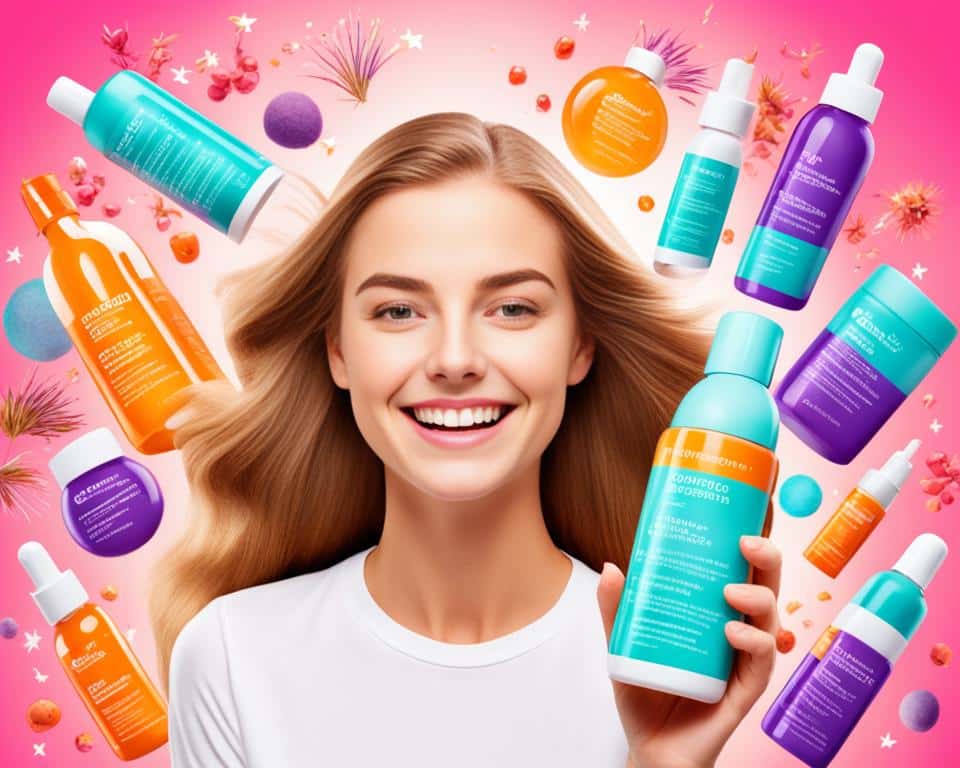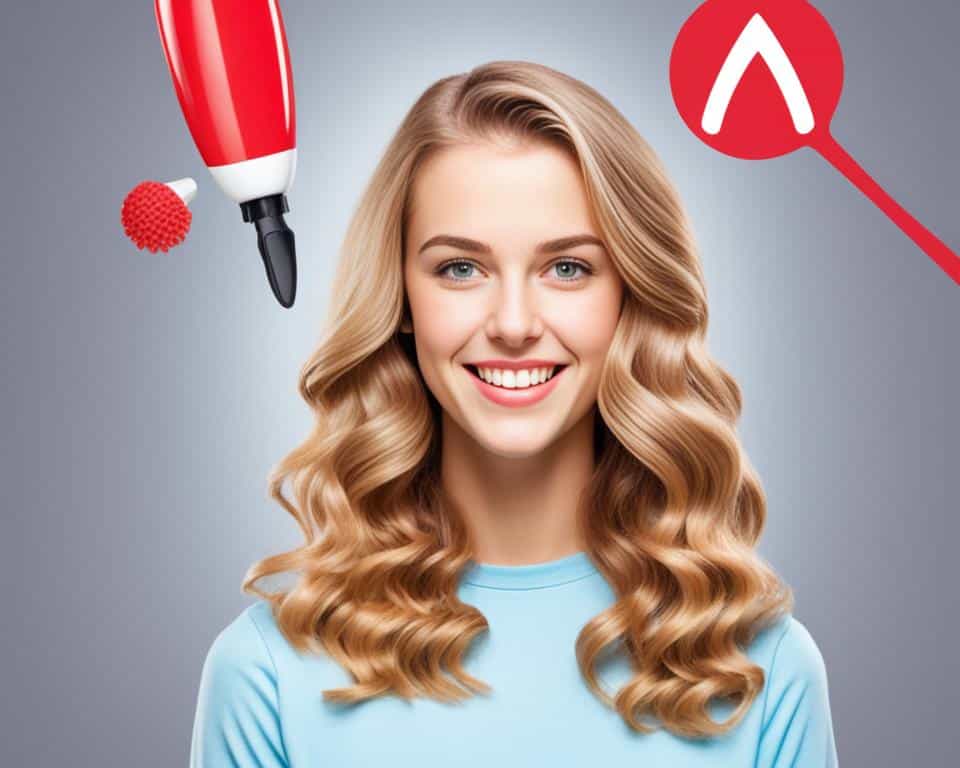Confronting hair loss can be a daunting chapter in the life of any teenage girl. It’s a condition that not only affects physical appearance but can also take a heavy toll on self-confidence. With teen hair loss prevention gaining traction in conversations about adolescent wellness, it’s important to navigate this sensitive topic with facts and understanding. Tremendous strides have been made in adolescent hair loss solutions, and ample opportunities exist for effective female teenage hair loss treatment.
There is a myriad of reasons why a teenage girl might experience hair loss—from genetics to lifestyle—and understanding these factors is crucial to reversing or managing the condition. But don’t fret; armed with the right knowledge and tools, combating hair loss is entirely possible. This article serves as a guide to illuminate the possibilities for hair restoration and maintenance that lie ahead.
Key Takeaways
- Understanding the underlying causes of hair loss is pivotal for effective prevention and treatment.
- Adolescent hair loss solutions range from simple lifestyle changes to medical treatments.
- Proper nutrition and hair care practices are cornerstones of female teenage hair loss treatment.
- Educating teens on hair health can significantly enhance their ability to manage and prevent hair loss.
- Seeking professional advice is recommended when over-the-counter remedies do not yield desired results.
Understanding Hair Loss in Teenage Girls
Hair loss in teenage girls is a multi-faceted issue, with factors ranging from genetics to the hormonal rollercoaster of adolescence playing their parts. Acknowledging the importance of confronting this delicate matter head-on, this section seeks to unravel the causes of hair loss, the impact of teenage hormonal changes, the critical role of nutritional deficiencies, and aims to debunk hair loss myths that often influence public perception.
Possible Causes and Common Myths
The onset of hair loss in young women can stem from a variety of origins. While genetic predisposition stands as a notable cause, external factors such as excessive styling and environmental stressors cannot be overlooked. Stress, another significant contributor, particularly in the formative years of complex social networks and academic pressures, can induce a temporary hair loss condition known as telogen effluvium. In contrast, the ubiquity of hair loss myths leads to a proliferation of misinformation. Myths such as the notion that frequent washing and brushing induce hair loss must be dispelled to foster a more accurate comprehension of this condition.
How Hormones Can Affect Hair Health
Teenage hormonal changes are renowned for their profound effects on the body, and hair health is no exception. Puberty sparks a surge of hormones like estrogen and progesterone, which generally promote hair growth, but fluctuations can lead to the opposite effect. Hormonal imbalances are also interlinked with conditions like Polycystic Ovary Syndrome (PCOS), which can lead to thinning hair among other symptoms. Addressing these hormonal imbalances often requires a multifaceted approach, including consultation with healthcare professionals.
The Role of Diet and Nutrition
Nutrition plays an integral role in every aspect of physical development during teenage years, including hair health. Nutritional deficiencies, such as low levels of iron, vitamin D, and essential fatty acids, can stunt hair growth or even lead to hair loss. Maintaining a diet that is rich in essential nutrients is not only conducive to overall health but is also a critical component in ensuring that the hair follicles have the necessary support to foster healthy hair growth and strength.
Teenage girls experiencing hair loss should scrutinize their diet, lifestyle, and hair care regimen, addressing imbalances and deficiencies for enhanced hair health.
In summary, understanding the myriad causes and dispelling the myths related to hair loss are paramount in providing effective care and support for teenage girls facing this condition. Hormonal shifts and nutritional choices cast substantial influence on hair vitality, emphasizing the need for awareness and intentional action in managing hair health.
How to Stop Hair Loss in Teenage Girl
From perfecting a gentle hair care routine to exploring natural hair loss treatment options and knowing when to seek advice from a trichologist or a dermatologist specializing in hair loss, there’s a multitude of approaches teenage girls can take to combat hair loss. Here, we delve into daily practices and natural remedies that have been recognized for their potential in preserving hair health, as well as when professional help becomes a critical next step.
Daily Hair Care Practices
Adopting a mindful hair care routine is essential for teenagers grappling with hair loss. Steps such as using sulfate-free shampoos, minimizing heat styling, and avoiding tight hairstyles can greatly reduce hair breakage and scalp stress. Regular scalp massages with suitable oils can stimulate circulation, encouraging healthy hair growth and strength. It’s equally important to prevent damage by not brushing hair when wet and using a wide-tooth comb to detangle carefully.
Natural Remedies and Their Efficacy

Natural remedies often vie for attention in the hair care space, with numerous anecdotal claims and some backing from scientific studies. Ingredients such as rosemary oil, peppermint, and aloe vera are celebrated for their potential in supporting hair strength and growth. For instance, a regular application of rosemary oil has been correlated with increased hair thickness in some studies. However, it’s key to remember that responses to natural remedies can vary greatly, and what works for one individual might not work for another.
When to Consider Professional Help
When over-the-counter treatments and home remedies fall short, consulting a trichologist or a dermatologist specializing in hair loss should be considered. These professionals can offer tailored advice, conduct thorough scalp examinations, and prescribe targeted treatments. They’re also equipped to perform tests to get to the root cause of hair loss, which could range from nutritional deficiencies to hormonal imbalances. Below is a comparative overview of when each professional might be consulted based on specific hair loss concerns:
| Hair Loss Concern | Consult a Trichologist | Visit a Dermatologist |
|---|---|---|
| Initial assessment of hair and scalp condition | Yes | Optional |
| Chronic hair thinning with no apparent cause | Yes | Yes |
| Over-the-counter remedies not working | Optional | Yes |
| Suspected underlying skin condition | No | Yes |
| Detailed hair loss treatment plan | Yes | Yes |
Ultimately, embarking on a hair care journey to tackle hair loss requires patience, commitment, and sometimes, professional intervention. By engaging in these practices and seeking the right help, teenage girls can navigate and effectively manage the challenges of hair loss.
Effective Hair Loss Treatments for Teens
When it comes to combating hair loss in teenagers, it’s essential to explore a spectrum of hair growth products that are both safe and have a scientific backing. With an array of medical hair loss solutions now available, it’s possible to find an effective treatment tailored to the unique needs of each individual. Let us delve into some FDA-approved hair loss treatments and emerging therapies making waves in the journey towards healthy hair restoration.

Over-the-counter products often serve as the first line of defense, offering a convenient and less invasive approach. These typically include minoxidil-based formulations, universally recognized for their efficacy in promoting hair regrowth. Prescription medications, such as finasteride, have also proved beneficial, although they are generally not recommended for use by teenagers without close medical supervision.
The table below offers a concise comparison of different treatments available, reflecting their general uses and considerations.
| Treatment Type | Common Products | Suitability for Teens | Considerations |
|---|---|---|---|
| Over-the-Counter | Minoxidil (Rogaine) | Suitable with doctor approval | Patience required as it may take months to see results |
| Prescription Medication | Finasteride (Propecia) | Typically not recommended for teens | Requires medical prescription and close monitoring |
| Emerging Therapies | Laser Therapy Devices | Suitable | More research needed, but promising results in hair growth stimulation |
| Natural Supplements | Biotin, Viviscal | Suitable | Should be used as a complement to other treatments, not a sole solution |
It’s important for teenagers and their guardians to consult healthcare professionals before starting any treatments, as they can provide guidance based on a thorough diagnosis and medical history. Moreover, medical experts keep abreast of the latest research and developments in hair loss solutions suitable for teenagers, ensuring patients receive the most informed and personalized care.
Always prioritize safety and FDA approval when opting for hair loss treatments; professional medical advice is the cornerstone of any effective treatment plan.
While navigating the complexities of hair loss can be challenging for teens, the good news is that the right combination of over-the-counter options, professional medical advice, and emerging therapies can pave the way for successful management and restoration of hair health.
Lifestyle Adjustments to Prevent Hair Thinning
Adopting a holistic approach to health not only benefits overall wellness but also plays a significant role in the prevention of hair thinning in teenagers. Key lifestyle adjustments can have a profound impact, with particular emphasis on maintaining a balanced diet, managing stress levels effectively, and considering the role of supplements for hair health.
Importance of a Balanced Diet
A balanced diet for hair growth, rich in essential nutrients, is foundational for maintaining lush, healthy hair. A diet that includes omega-3 fatty acids, which can be found in fish like salmon and flax seeds, helps to nourish the hair follicles. Adequate protein intake from sources such as lean meats, beans, and nuts is vital for hair growth, as hair is primarily made up of protein. Additionally, iron-rich foods like spinach and legumes are crucial for avoiding the hair loss that often comes with iron-deficiency anemia. The incorporation of these nutrients fosters a fertile ground for healthy hair to thrive.

Managing Stress Levels in Teenagers
Chronic stress is a known exacerbating factor for many health issues, including hair thinning. Effective stress management techniques could be instrumental in reducing this impact. Encouraging teenagers to engage in regular physical activity, mindfulness practices, and relaxation exercises can help regulate stress hormones that may otherwise interfere with the hair growth cycle. Creating a sustainable routine that includes time for activities such as yoga or even simple breathing exercises can bring long-term benefits for stress relief and consequently, hair health.
Vitamin Supplements and Hair Health
While a balanced diet is the preferred source of nutrients for hair health, hair health supplements can play a supportive role. Supplements such as biotin, zinc, and vitamins A, C, and E have been linked to improved hair structure and growth. However, it’s critical to approach these supplements with caution—they are not a cure-all and can be harmful in excessive amounts. Consultation with a healthcare provider is essential to ensure that any additional supplementation is safe and tailored to the individual’s specific nutritional requirements. Incorporating the right balance of hair health vitamins, under professional guidance, can be a valuable component of a comprehensive hair care regimen.
In summary, making informed lifestyle adjustments can be one of the most powerful ways for teenagers to prevent hair thinning. A balanced diet for hair growth, effectively managing stress levels, and an educated approach to hair health supplements are collectively a robust trifecta of prevention strategies in fostering a nurturing environment for a healthy head of hair.
Common Mistakes That May Lead to Hair Loss
The journey to maintaining a lush crown of hair is often undermined by routines unknowingly rooted in harmful styling practices, over-processing hair, and negligent hair care habits. Teenagers and adults alike can benefit from recognizing the daily missteps that may be contributing to hair loss. Let’s investigate these common errors and outline strategies for a more nurturing approach to hair care.

Over-Styling and Heat Damage: The seductive sheen of straighteners and curlers can frequently lure one into a cycle of damage. High temperatures strip away moisture, making hair brittle and susceptible to breaking.
Tight Hairstyles: That slick ponytail or tight braid may assure a polished look, but it also potentially assures damage. Prolonged tension can lead to traction alopecia, where constant pulling gradually weakens hair follicles until they no longer produce hair.
Chemical Treatments: Chemical straighteners, perms, and lighteners can dramatically alter hair’s texture and color. However, those chemicals can also weaken hair’s natural structure, leading to breakage and thinning.
By moderating the use of styling tools, opting for looser hairstyles, and minimizing chemical treatments, individuals can take significant strides in preserving their hair’s health.
Prevention is always better than cure. By understanding and steering clear of these widely prevalent pitfalls, one can curtail hair loss and foster stronger, healthier hair.
- Avoid using styling tools on high temperatures to prevent moisture loss and cuticle damage.
- Choose hairstyles that minimize scalp tension to protect hair follicles.
- Limit the frequency of chemical treatments and always seek professional guidance when doing so.
- Invest in quality hair care products that nourish and rebuild hair structure.
In addition to these tips, see below a helpful guide to enrich your hair care regimen and avoid the stealthy advance of hair loss:
| Harmful Practice | Safe Alternative | Benefits |
|---|---|---|
| High-heat Styling | Moisture-infused or heat-protectant styling | Prevents moisture loss and reduces breakage |
| Tight Hairstyles | Looser hairstyles with soft hair ties | Alleviates tension and protects hair follicles |
| Heavy Chemical Usage | Mild, natural hair treatments | Preserves natural hair structure and integrity |
| Neglecting Routine Care | Regular moisturizing and trimming | Promotes healthy hair growth and reduces split ends |
By adopting these hair-health-conscious habits, not only will you combat potential hair loss, but you will also revel in the vibrancy and strength of your naturally beautiful hair.
Conclusion
Throughout our exploration of teenage hair loss, we’ve uncovered a wealth of strategies to manage and reverse this challenging condition. By embracing hair loss solutions grounded in scientific research and tailored to individual needs, teenage girls can reclaim control over their hair health. It’s imperative to understand the multi-dimensional nature of hair loss to effectively address it, from the basics of gentle hair care to the complexities of medical treatments.
Summarizing Key Takeaways
Teen hair care education has emerged as a critical tool in fighting hair loss, emphasizing the pivotal role of informed daily routines and nutritional choices. As we’ve seen, prevention and early intervention, leveraging FDA-approved products, can make a significant difference in maintaining a healthy scalp and hair. Recognized practices such as avoiding harsh treatment, gentle styling, and incorporating a nutrient-rich diet are key elements in this endeavor.
Encouraging a Positive and Proactive Approach
A positive and proactive mindset is essential when dealing with hair loss. Moving past the challenges, teenagers are encouraged to actively participate in their journey towards healthier hair by consistently applying what they have learned about hair maintenance. Consistency in care, patience with treatment, and a proactive attitude towards developing good hair habits provide a solid foundation for improved hair health.
Continued Learning and Consultation with Specialists
Hair health is an ongoing journey that benefits from continued learning and regular consultations with hair loss experts. Whether it’s keeping up-to-date with the latest in trichology or seeking personalized advice from dermatologists, using professional resources can vastly improve the effectiveness of hair loss management. Consult hair loss experts to ensure the best approach, embrace innovative solutions, and most importantly, maintain the healthiest possible outcome for one’s hair.


Reply